#leslie cheung my beloved
Text
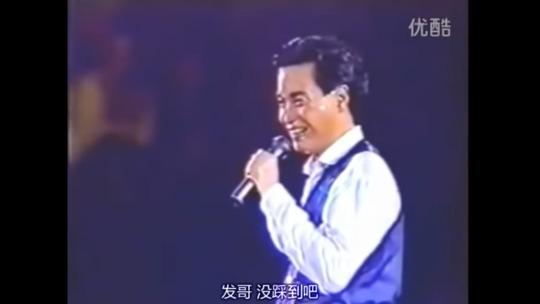

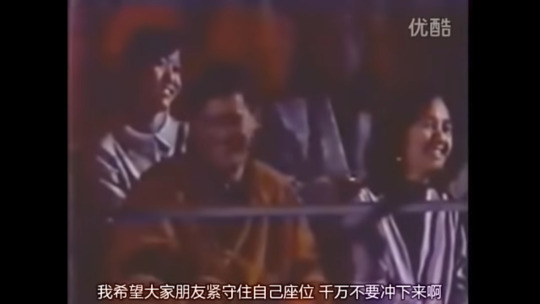
wait help chow yun-fat was there and hiding his face when called out LMFAOO
#ling.txt#oh a better tomorrow (1986) my beloved... they were SO good in that <3#i love how the crowd just goes wild when leslie was like fat-gor :)!!!#like. wilder than they already were ig kfhgjkg#honestly everyone always talks abt leslie's and anita's (admittedly legendary) friendship#but leslie cheung and chow yun-fat were also rly good friends!!#this is a 1989 concert that. i guess never got remastered or the person who uploaded it didnt feel like remastering it dkjghkfdg#but i prommy the sound is great which is the more important part#literally what is it abt artists sounding better live..............
7 notes
·
View notes
Text
watching farewell my concubine for the first time. leslie cheung my beloved, here we gooo
9 notes
·
View notes
Note
I’m so excited for man suang! It’s giving me farewell my concubine with leslie cheung. Just because of the past trailer with apo painting his face and looking so beautiful. I think it’s gonna be political/historical and sad. i want them to give hints on the plot but i also wanna be surprised lol. Love ur blog btw it got me into a mileapo rabbit hole.
glad to be a provider of drugs 😂😘
yeah, I hope so! farewell my concubine is beloved and iconic to this day. i've seen the parallels for a while, but let's hope the film lives up to the expectations. KPTS, the art was beautiful and they made something incredible out of to be honest a fairly messy and mediocre novel, so I think we'll likely be OK
8 notes
·
View notes
Note
a hidden life, brokeback mountain, chungking express for the movie ask <3
A hidden life
never seen | want to see | the worst | bad | whatever | not my thing | good | great | favorite | masterpiece
Aaah this movie!! Despite it having, pass me the term, a 'simple' and linear plot, it's amazing, because it shows literally an 'hidden' (eheh) side of WWII, a reality that it's quite never shown to us and I'm really glad it was, especially after learning that it's based on a true story, in fact after the movie ended, I started making all sorts of researchs. And what makes this movie even better, is Terence Malick's directing style, and honestly I can't imagine anybody else directing it. They way he captures the scenery, the way the mountains become characters too, witnessing all the events, giving this false hope that they'll shield Franz from the war, but even there, it found him. + August Diehl my beloved, he's such a great actor and super underrated!!
Brokeback Mountain
never seen | want to see | the worst | bad | whatever | not my thing | good | great | favorite | masterpiece
I have to admit I watched this only once, because I promised myself I would never watch it again, it really left a scar. I think I never cried that much in my life, and the funny thing is that I watched it while I was on vacation lmao, and I literally was in my bed, crying with my hand on my mouth, trying to not make a sound and wake up my parents. Even tho I watched it only once, i loved it, the story is simply heart breaking, and Heath's and Jake's performances are so good!! It really shows their talent, not to talk about their on-screen chemistry. And that scene where Ennis and Jack reunite...I-.
Chungking express
never seen | want to see | the worst | bad | whatever | not my thing | good | great | favorite | masterpiece
I LOVE THIS MOVIE!!!! AND I LOVE WONG KAR WAI!! It was the second movie of his that I watched, because I first saw Fallen angels, and it really made me fall in love with his movies even more. Not to talk about Tony Leung, that man!!!! OMG I LOVE HIM, he's so GOOD and he's probably my fave of the HK actors, but Leslie Cheung has a place in my heart too. I'm digressing lmao. I love this movie a lot, especially for the plot, because I'm a sucker for those movies that make you think your following the story of a character but then the focus shifts to another story and complete different characters, when I saw that I almost screamed. I can't say this is my my favourite, because honestly I love all his movies equally, they're so unique!! How can you choose?! lmao.
9 notes
·
View notes
Note
hello ! Sorry to bother But I was wondering if u had any 90's Hong Kong movies that you could recommend me ? I'm researching them for school and I usually get the most interesting and gutwrenching sinophone movie recs from your blog so I thought I should ask if u had any ! Thank u ❣️
Hey you 🥰 this is probably waaaaaay to late to be of any help with your research (sorry!) but I'll answer anyway just in case <3 (also, it got. a bit long 😳 so sorry about that lmao)
I'll start off by addressing the elephant in the room, a.k.a. Wong Kar-wai: the director you really can't avoid mentioning when talking about 90s and 00s Hong Kong cinema, and for good reason. I won't mention all his films here, but his best known are probably In the Mood for Love (which is regularly hailed as one of the greatest films ever made, which. yes); Happy Together (a staple of queer cinema starring Tony Leung and Leslie Cheung caught up in a fever-like, destructive love affair in Buenos Aires); Chungking Express (another classic beloved by many, many people); Fallen Angels (a stylish and chaotically seductive about eccentric figures inhabiting Hong Kong's nightlife).
Another director from this period who I think is worth highlighting is Stanley Kwan. He's probably best known for Rouge, which is from 1987 but which I’m including because it’s a classic; it stars the wonderful Leslie Cheung and Anita Mui as the principals in a doomed, decades-spanning love affair, featuring sumptuous visuals, ghosts, and time-slippages between the 1930s and 1980s. His other most notable work is probably Center Stage (1991); it's a very meta biopic of the 1930s actress Ruan Lingyu, who is portrayed by Maggie Cheung, and Kwan uses the film to draw parallels between the two actresses living decades apart. And I'll also mention his Lan Yu (2001), a gay love story set against the backdrop of Tiananmen Square and its aftermath (it's probably weird to admit that this is one of my comfort films but shrugs).
Comrades: Almost a Love Story (1996) is an absolute favourite of mine, about immigrant identity, missed chances and lives you could have led, human connection under capitalism, and the love story between two people whose paths keep crossing despite everything--all of which is topped off with fantastic performances from Maggie Cheung and Leon Lai.
Farewell My Concubine (1993) was a Hong Kong-mainland co-production and is probably one of the best known films on this list, starring the fantastic Leslie Cheung in one of the defining performances of his career (tbh it would be worth watching for his performance alone). Coming in at just under 3 hours, it's a cinematic epic in pretty much every sense of the word.
Speaking of Leslie Cheung: Viva Erotica (1996), in which he plays an arthouse director whose Serious Films keep flopping, so he has to turn his next film into an erotic movie financed by a triad boss. It’s funny and big-hearted and has some unexpectedly interesting things to say about filmmaking and cinema as both an industry and as an artform.
Ann Hui is one of the few female big-name Hong Kong directors of the 90s; I'd recommend her 1990 film Song of the Exile--a film about generational conflict, immigration, cultural alienation and family ties, which takes place across the UK, Hong Kong, and Japan, and stars Maggie Cheung in the lead role. (Another prominent woman director from the period whom I've been meaning to watch since forever Mabel Cheung--really looking forward to finally seeing something of hers soon.)
Takeshi Kaneshiro and Kelly Chen had quite a few collaborations which are rather nice. Their Anna Magdalena (1998) is a quirky but poignant love-triangle story that inexplicably turns into a delightful steampunk romp. Lost and Found (1996) is another quirky-but-poignant love story, albeit a little more sedate.
For action films, there's the legendary John Woo, whose films are pretty quintessential action flicks--Hard Boiled is a pretty good example of his filmography. There's also The Heroic Trio and Executioners (both 1993): an action duology starring Michelle Yeoh, Maggie Cheung and Anita Mui as a trio of ass-kicking vigilante superheroes. It's sooooo much fun, peak cinema, marvel could never, etc. etc. I'm also going to mention Infernal Affairs (2002), starring Tony Leung Chiu-wai and Andy Lau, because it's one of my favourite action thriller films of all time.
Wuxia: a lot of the most well-known titles of the genre are from the first decades of the 2000s, and because of their scope they tend to be international productions, but often had veteran Hong Kong actors in main roles (for example, Crouching Tiger, Hidden Dragon (2000), Hero (2002), House of Flying Daggers (2004)--all of which I would recommend, btw). But there were also quite a few wuxia films that came out of Hong Kong in the 90s, including New Dragon Gate Inn (a fun 1992 remake of the 1960s wuxia classic, starring Brigitte Lin, Tony Leung Ka-fai, Maggie Cheung); The Green Snake (1993), a retelling of the traditional Legend of the White Snake that doubles as an interesting deconstruction of lots of the main tropes of the wuxia genre; Wong Kar-wai's 1994 Ashes of Time, which has an insanely star-studded cast and is pretty much what you'd expect a wkw wuxia film to be like.
.......aaaaaaand i'm going to stop there, because this is already a Lot😅 but hopefully there's something of use in here--if not for your research, then at least recommending a new film to watch <3
#mandatory 'sorry for the late reply i was on hiatus'#or well semi-hiatus#although i think everyone knows by now how useless i am at remembering to check my inbox#😅#bbscclmate#ask response#hong kong movie#i also should add the necessary disclaimer that i am by no means an expert and there are definitely lots more films worth mentioning that..#.....i simply haven't seen yet#i've only mentioned ones that i've watched but they're just a tiny fraction of everything on offer!!!!
5 notes
·
View notes
Text
大熱 is already my second most listened to song of the last 365 days even though i listened to it for the first time <90 days ago
as it should be
0 notes
Text
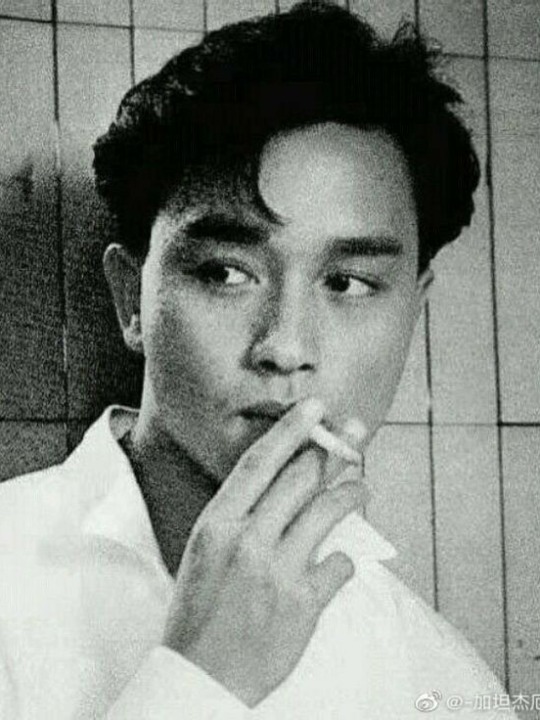
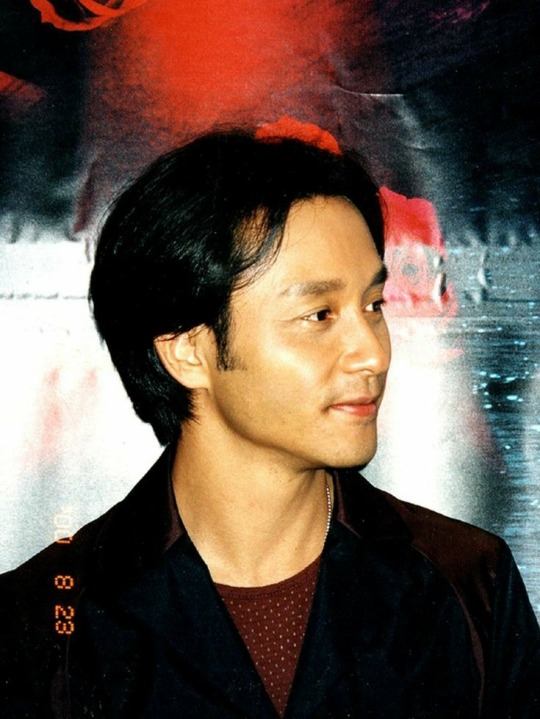
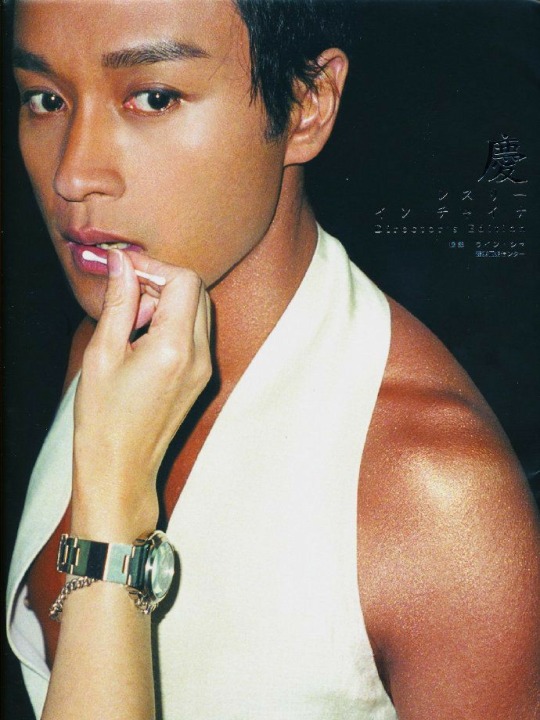
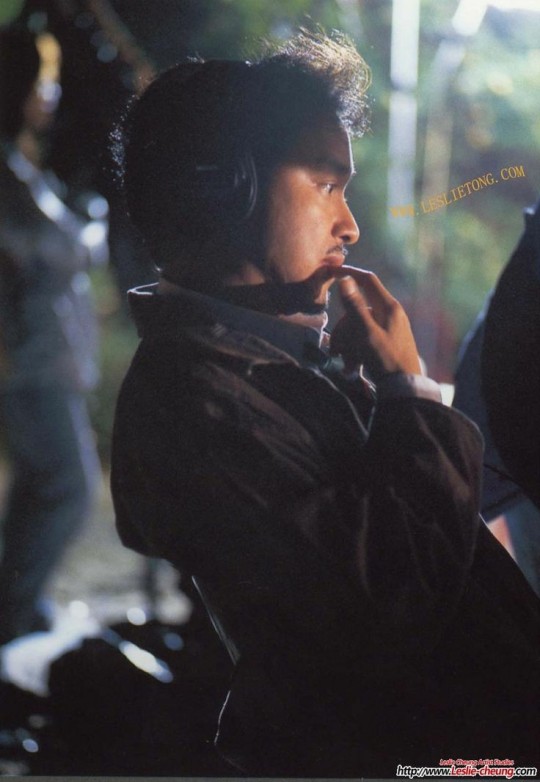
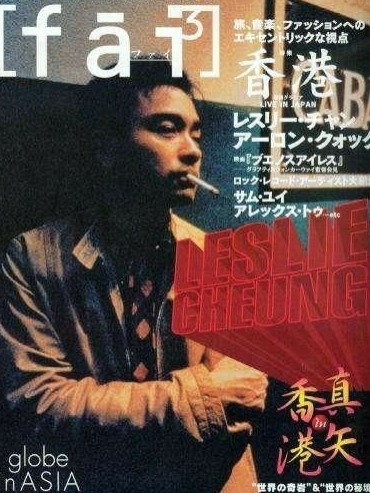
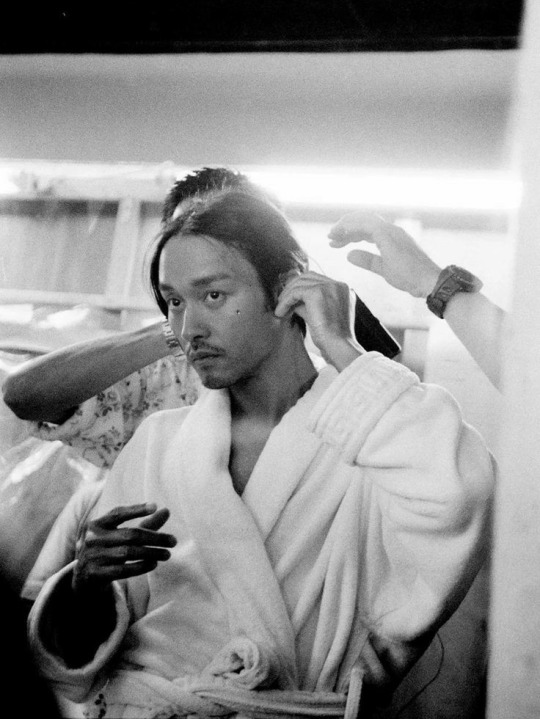
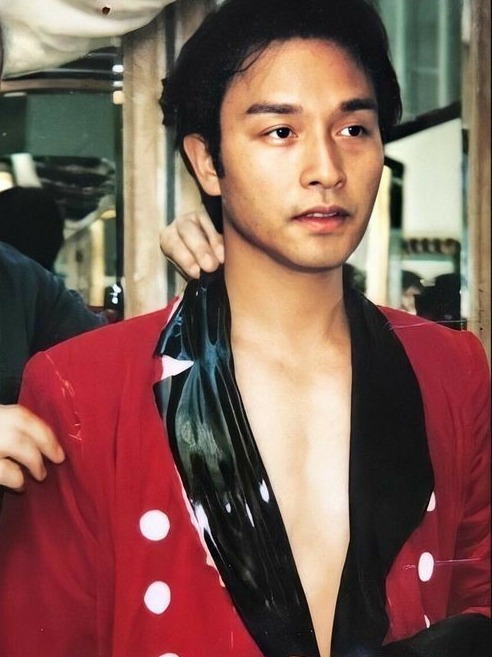
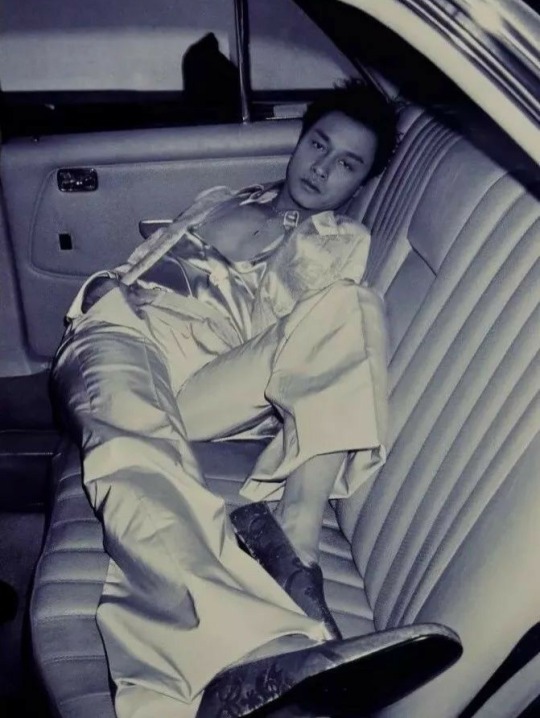
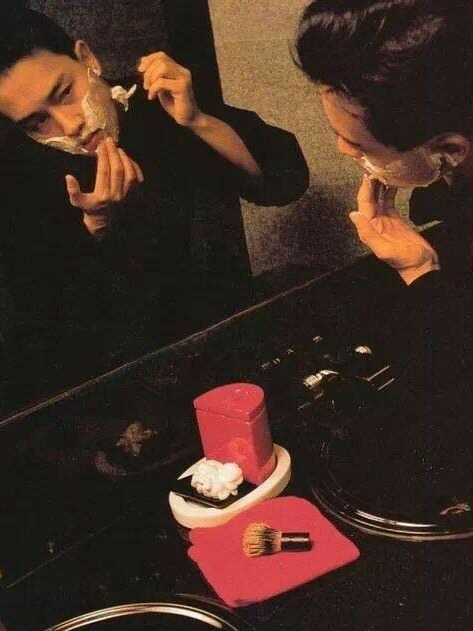
hes v neat to me
#his birthday is my excuse to post my fav pics of his#and i have a LOT#leslie cheung#edit: his borthday is sep 12 but i made this post earlier because asia is ahead of where i live and i was already seeing stuff celebrating#it so i was like why not make this post earlier :) but yeah just clearing up it up cause i saw some confusion#☆゚* 🍰・゚ music ; leslie my beloved
2K notes
·
View notes
Photo
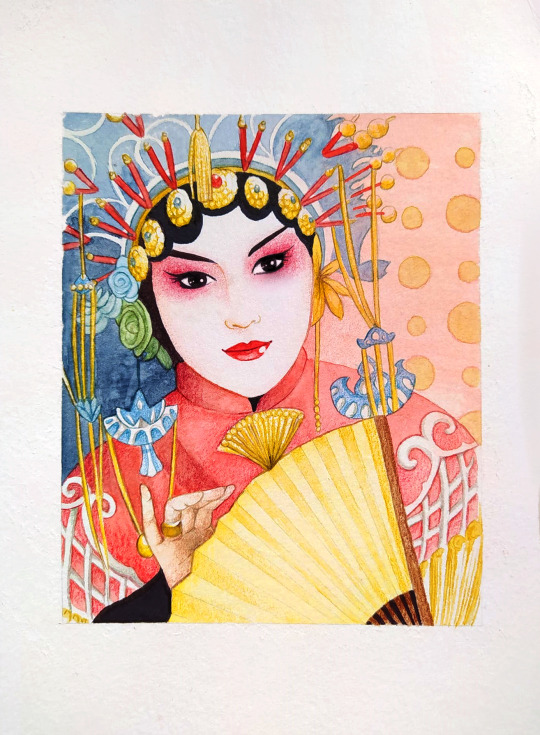
This is different from what I usually upload here. But I drew this years ago and decided to finish painting it today. Watercolors are scary
— Inspired by a poster from Farewell My Concubine (1993)
#Farewell my concubine#Leslie Cheung#Cheng Dieyi#my art#fanart#drawing#art#illustration#watercolors#Thanks to my beloved waifu who inspired me to finish this piece ♥
57 notes
·
View notes
Photo

Leslie Cheung Kwok-Wing 張國榮 (12 September 1956 – 1 April 2003)
Celebrated Actor, Singer, Idol
Queer Icon
Those who’re from the Sinosphere, or who’ve followed Chinese-speaking entertainment, probably all know Leslie. Through his 25-year career, he had swept numerous singing and acting awards. A born dancer, his stage presence was phenomenal, and his charisma undeniable — warm and disarming, while also carrying a unique sense of humour from his eight teenage years spent in the UK. His face could, of course, launch a thousand ships.
He was so beloved that his native city of Hong Kong had an endearing, homely nickname for him: Gor Gor. Based on one of his popular movie roles, it means elder brother in Cantonese—same as Ge Ge in Mandarin.
So yes, Leslie was/is my original Gg. When I say Gg in the context of entertainment, I still think of him first. In fact, when I speak out loud about Turtledom’s Gg and Dd, I still call them “The Big One” and “The Little One” — because calling “The Big One” Gor Gor doesn’t feel right.
Gor Gor (哥哥), to me, is always Leslie.
(TW: Homophobia; Suicide)
Leslie is also remembered, of course, for two things: one, he was queer, and two, his suicide in 2003. These are usually about the last things I'd like to talk about in a dedication post to anyone I know through their career, but Leslie is now considered Asia’s queer icon, The Example offered when people talk about queers who’d achieved the pinnacle of fame and recognition in Chinese-speaking entertainment — as if his queerness had all along been accepted, or even celebrated before his death.
To put it simply, it wasn’t. And I think this is a piece of Chinese-speaking entertainment history that those who've wondered about queer c-ent artists should know, and that, I believe, Leslie would wish for people to know.
First, it’s important to point out that Hong Kong’s view of homosexuality is different from China’s — the reason being that Hong Kong was built pretty much from the ground up as a British colony. With few established institutions prior to its colonization in 1841, it had not only followed the British-style Common Law in which homosexuality had been considered a crime of sodomy with a maximum sentence of life imprisonment, Christianity had also exerted a far heavier cultural influence there. This means the brand of homophobia in Hong Kong is, like the city itself, a mix of the East and the West: homosexuality is not just a crime against filial piety by being a deterrent to the continuation of the family name—which is “bad”, but only for the family—it’s also a sin in the religious sense—bad for the entire universe.
And so, homophobia in Hong Kong was real. Very real.
(I’m leaving a detailed discussion of this in its own post, but the “bad, but only for the family” view of homosexuality has given rise to a unique class of queer acceptance in Chinese societies: “not-in-my-backyard” acceptance. Queers are fine until they enter one’s social sphere, until they’re close enough to exert influence on, especially, the boys in the family.)
Back to Leslie. Leslie’s career could roughly be divided into four phases. The first phase was his “nobody” period (1977-1985). The second, his idol period (1985-1989). The third, his actor period (1991-1997). The fourth, his “out” period (1997-2003).
During his “nobody” period, in which he was struggling with his career and wasn’t well known, he fell in love with his co-host of a radio-show, Teresa Mo (毛舜筠). She was his first love, Leslie said, the first person he sent roses to, and he proposed to her after a very quick courtship. She was terrified—she was only 17 (16 is the minimum age of marriage)—and she said no. If she’d said yes, Leslie would say years later in an interview hosted by Teresa, his life would’ve been completely different. They would stay friends and act together.
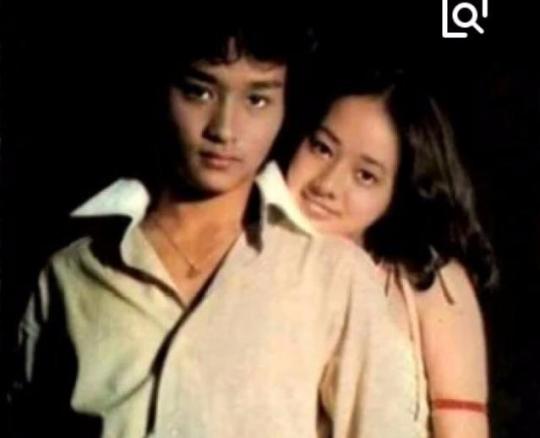
Leslie + Teresa, circa 1978.
And so, despite most news articles describing Leslie as gay, he was actually bisexual—as he confirmed that in a TIME Asia interview in 2001.
Leslie met, or rather re-met the man who would be the love of his life, Daffy Tong Hok-tak (唐鶴德), in 1982, when Leslie was 26 and Daffy, 24. Daffy was also Leslie’s childhood friend—both came from prominent families in Hong Kong (Leslie’s father was a famous bespoke tailor).
Multiple versions of rumours have existed as to when, exactly, Leslie and Daffy hit it off—whether it was love at first sight, whether they broke up several times at first, whether Leslie had a girlfriend for some time, etc etc. But what was known was they finally got together, for good, in 1985.
1985 was also the year Leslie’s career truly took off. Leslie began his idol phrase, and that was when he achieved his superstar status—not only in Hong Kong but over the next few years, in the whole Sinosphere, and also in Korea. Hong Kong entertainment industry, which was nicknamed Eastern Hollywood then, was also at its height of influence; his songs and dances were imitated by everyone. Below is probably the most iconic of his performances during his idol phase (song: 無心睡眠 Sleepless Night 1988):
youtube
When asked about the rumours between him and Daffy during this period, he called it a slander. In other words, Leslie remained closeted throughout his idol phase. He had no choice — homosexuality wouldn’t be decriminalised in Hong Kong until 1991. (Here’s a quick timeline of LGBT+ rights milestones in Hong Kong; same-sex marriage remains illegal.)
(When people listed Leslie as an example of an out and prominent Chinese-speaking idol, therefore, it wasn’t correct. Leslie achieved his superstar status, his prominence long before he officially came out in 1997 — and this significant time delay (12 years) was, IMO, essential to the fondness in how people remember him; if he had come out during his idol phase, he wouldn’t have been remembered so favourably, if at all — his idol career wouldn’t have survived especially in the 80s, at the height of AIDS phobia.)
In 1989, Leslie made a shocking announcement that he would retire from HK entertainment, and held a farewell concert series. Hong Kong concerts, BTW, were 3-hour long spectacles held over multiple nights—with the number of concerts held seen as the indicator of the singer’s popularity; that concert series went on for 33 nights. The reason of the retirement, as it turned out, was like many Hong Kongers’ at the time—Leslie decided to emigrate to Canada as the 1997 handover of the city back to China approached. Daffy, a well-established banker by then, moved to Vancouver with him.
The retirement didn’t last long. Leslie missed performing, and returned to HK in 1991—this was also a common story among Hong Kongers who left, who returned to the city because they missed everything about it too much. He began his acting phrase then, in which he shifted his focus from singing to acting. By leaving behind his idol status associated with his singing — the retirement break allowed a smooth transition — he was able to expand the roles he could play, including those that, seriously or not, challenged heteronormativity and gender stereotypes. In the popular comedy He's a Woman, She's a Man (金枝玉葉; 1994 dir: Peter Chan), he played a music producer who fell in love with a fan who cross-dressed as a man. A famous line from this film: 男也好,女也好,我只知道我中意你 (”Man or Woman, I only know I love you”) is tame by today’s standards, but films that touched on homosexuality, even as a comedy, was very rare at the time. In an interview surrounding the film’s promotion, Leslie said:
香港人對gay的處理太過喜劇化、太過醜化,我覺得並不需要如此……
The treatment of gays by Hong Kongers is too comical, too vilifying. I don’t think that’s necessary ...
The most famous queer-themed film projects Leslie took, however, were undoubtedly Farewell My Concubine (霸王別姬 1993: dir: Chen Kaige) and Happy Together (春光乍洩 1997, dir: Wong Kar-Wai). In Farewell My Concubine, Leslie played a Chinese opera singer, Chen Dieyi, who sang the part of the titular concubine and fell in love with “her” king, both on and off stage; the story’s backdrop was the from Republican period all the way to the Cultural Revolution, and it depicted how lovers on stage—the Emperor and his Concubine—were finally forced to turn against each other due to Cultural Revolution’s Reporting Culture.
(Not sure how long this link would last, but you can watch the film here.) (I recommend it!).
Happy Together, meanwhile, was about a gay couple who attempted to repair their relationship with a trip to Argentina. It was probably my favourite Leslie film: he, along with Tony Leung Chiu Wai (梁朝偉), gave a mesmerising performance, and their relationship was turbulent, passionate and complex, and I love everything about it. (Sorry, can’t find a link to the film!)
Meanwhile, because of Leslie’s professional success and superstar status, his love life had earned the treatment enjoyed by many other superstars from the city during the same period — as in, reporters and gossip rags loved him enough to say little about it. Because traditional Chinese culture does not favour an outward display of love — especially romantic love — there’s also a longstanding custom of getting the hints of who’s coupled with who and accepting them as facts without demanding verification. Stars who are beloved and respected by both the public and the media, therefore, often receive a pass on having to have evidences of their love life laid out for public consumption—the paps look away unless they smell something truly scandalous, and the public just nods with a knowing smile and doesn’t clamour for more information, as they do with their more traditional, keep-their-love-life-quiet friends. This is how many superstars of the time could have their relationships hidden for a long, long time — with Andy Lau (劉德華) ’s 23 years with his girlfriend and eventual wife, Carol Chu, being a famous example.
In other words, Leslie could’ve kept his relationship with Daffy in its murky, the-public-kinda-knows-but-doesn’t status, as long as he didn’t lose favour by the paps and his audience — and chances are, he wouldn’t, not for another decade or two, at least.
But Leslie chose to come out.
The date was January 4th, 1997 — 14 years + 2 weeks after Leslie and Daffy re-met at their godmother’s birthday party — and on the last night of his 24-concert series. He sang an old, Mandarin-language ballad from the 1970s, 月亮代表我的心 The Moon Represents My Heart, and and before that, he dedicated the love song to two people — his mom, who was in attendance, and Daffy.
About Daffy, his word choice was subtle (video here in Cantonese, starting ~ 1:40):
同埋呢,另外一位我覺得係我生命裡面好重要嘅一位好朋友。即係你嘅契仔。係我最失意嘅時候,經濟最差嘅時候,佢可以將佢所有嘅人工,幾個月嘅人工,借俾我渡過難關。你知我講緊邊個啦。當然就嘅我的好朋友唐先生啦! 係嘛?係依度,我要將依首歌送俾我依兩位摯愛嘅朋友同埋我嘅親人。
And, the other person is a very important, very good friend in my life. That’s your godson (Pie note: you=Leslie’s mom; Leslie was still speaking to her after dedicating the song to her.). When I was at my lowest point, when I was doing the worst in my finances (Pie note: remember, Leslie and Daffy met while Leslie was still in his “nobody” period), he could lend me all his earnings—his earnings from several months—to help me through my hardship. You know who I’m talking about, of course it’s my good friend Mr Tong! Right? Here, I’ll gift this song to these two, to my most beloved friend and family.
Note that Leslie didn’t refer to Daffy as anything more than his friend. He also assumed the audience knew who he was referring to by “Mr Tong”, and they did. They went wild. The concert series had already garnered media attention (more than usual) for one of Leslie’s song performances, a song performance that had hinted at the announcement to come—
The song was called 紅 Red, which Leslie composed the melody for. In this arguably most memorable performance of his career, Leslie famously wore a pair of sparkly, fire red Manolo Blahnik heels, and had an intimate dance with a male dancer. The performance ended with the dancers stripping the heels off from Leslie and changing him back into men’s black boots (I apologise for the awful camerawork for the video; this was the official recording. The song starts at ~ 2:30):
youtube
Those heels were so iconic that they were part of a 2017 exhibit called Ambiguously Yours: Gender in Hong Kong Popular Culture. Here’s the shoes and its description:
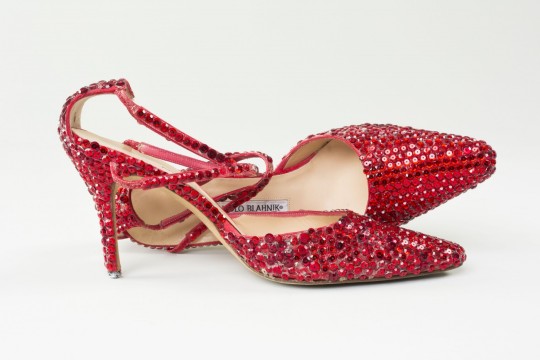
Description of the shoes for the exhibit:
“After Live in Concert 97’ I was at Leslie’s home one day when an idea struck him: “Sister, I have something for you! Something you can use so it doesn’t go to waste.” He then brought me a beautiful pair of high heels. He said he had bought two pairs of white satin high heels from Manolo Blahnik in New York just for the concert. After returning to Hong Kong, he had them dyed red and covered in red sequins. Since there was no need for the shoes afterwards, he gave them to me.
I wore them once. After he passed away, I was reluctant to put them on again, keeping them as is ever since.” ─ Nansun Shi
Leslie’s superstar status didn’t save him from ridicule after his coming out, even though the audience was in awe (and confused) by his only becoming even more irresistible after crossing the traditional gender line, his half-joking self-praise of being 姣、型、靚、寸 in local slang — very roughly, flirty, handsome, beautiful, cocky (風騷、有型、美麗、囂張), two traditionally masculine paired with two traditionally feminine adjectives. He was called 屎忽鬼 (”Ass ghost”), a rude local insult for homosexuals, among other terrible names. He hosted one more concert series in 2000-2001, The Passion Tour, in which he collaborated with Jean Paul Gaultier, who custom-made his costumes to highlight his bisexual, androgynous image—and while that concert series was well received when it toured Japan and Korea, it wasn’t well received in Hong Kong. The local media called his image "transvestite", "perverted" or "haunted by a female ghost", causing an angry Gaultier to email Leslie and criticize Hong Kongers for being ridiculous, claimed that no international designers would want to work on a Hong Kong show again. Meanwhile, the Japanese media asked Leslie: why does the HK media hurt its own artist?
The truth was, Leslie was too ahead of his time. “The pinnacle of what artist can do is to be able to place man and woman on the same person. Art is itself genderless” (藝人做到最高境界,是可以男、女兩個性別同在一人身上:藝術本身是沒有性別的), he said, in a society that was used to calling gender fluidity 不男不女 (”neither a man nor a woman”). Paps followed him, cumulating to this photo published in a gossip magazine on 2001/09/29 and would, to many, be the visual symbol of his relationship with Daffy, especially after his death:
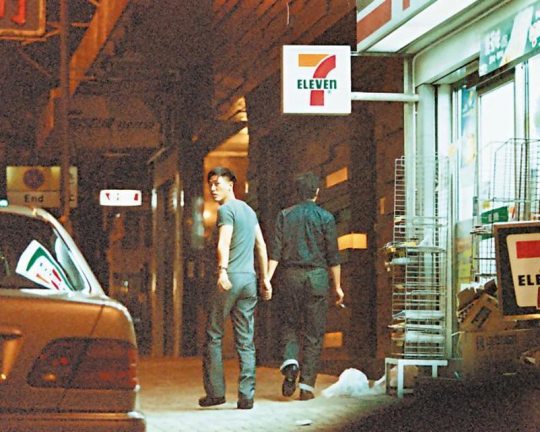
Leslie was in black; Daffy was in grey and looking back. The photo was memorable because they were holding hands—what some called “the most determined hand-holding of the century”. Even though Leslie and Daffy had regularly appeared together in public since 1997, and Daffy had played the equivalent role of Leslie’s spouse in Leslie’s family functions, they hadn’t been seen before doing anything regular friends wouldn’t do in public.
(If I remember correctly, the context of this photo was Daffy trying to shake his hand free when he spotted the paps, and Leslie held on.)
Because of the local’s poor reception and overreaction, perhaps, Leslie never made his bisexuality explicit for the Hong Kong media up till his passing. The only time he stated his bisexuality in words was for TIME Asia, an English-language magazine that few locals read. Still, he talked about Daffy when asked, both before and after the 1997 coming out, sometimes by name but far more often by implication; he shared candies, in turtle-speak. He tried to paint a picture of his romantic life while bypassing the controversial, feared queer labels.
Here are some examples of what Leslie had said about his relationship with Daffy:
“其實同一個人生活這麼多年後,結不結婚已不重要,我覺得我們已經結了婚.無論多忙,無論相隔多遠,我們每天給對方打電話,我是一個愛家的人。雖然我的家的組成有些與眾不同。” (1997)
Actually, to have lived so long with one person, marriage is no longer important. I feel we’ve already got married. No matter how busy I am, no matter how far we are, we call each other everyday. I love my home; even though the composition of my home is somewhat different.
“我覺得用中文講我愛你太肉麻,我只會用英文講 I love you。如果我唱情歌畀一個人聽,可以瞓覺前唱畀佢聽,醒之後都可以唱畀佢聽。” (2000; Passion Tour)
“My feeling is: to say “I love you” in Chinese is too much. I’d only say “I love you” in English. If I am to sing a love song for someone, I’d sing it for them before they go to sleep. Or after they wake up.”
“你們讓我覺得好專業! 每晚都是唱給全場幾千人聽。但是如果我要唱《 I HONESTLY LOVE YOU 》給一個人聽,Anytime都得。 ……我可以睡覺前唱,又可以睡醒唱。我可以日日夜夜都唱給他聽。因為我相信我們來日方長。” (2000; Passion Tour)
“(Pie note: Leslie is speaking to his concert audience) You make me feel so professional! Every night I’m singing for the thousands of people in the stadium. But if I were to sing “I HONESTLY LOVE YOU” for one person, I can do it anytime ... I can do it before I sleep, after I wake. I can sing day after day, night after night. Because I believe we’ll have a long road ahead.”
(Including this latter quote because my inner turtle is wibbling: Leslie said 來日方長.)
(Here’s a video of Leslie singing I Honest Love You in English, for which the last two quotes were said.)
[毛舜筠問: 即是認定了,這個是你的終生的伴侶了?]
一定的,很開心的,是一種blessing(恩賜),是主賜給我的。(2001)
[To the question from his first girlfriend, Teresa: “so you’ve determined that this is your life long companion?]
Definitely. Very happily. It’s a blessing. It’s a gift from God.
Another “candy” Leslie threw: in the pre-Kadian age, license plates were a form of expression. Hong Kong’s license plate has a format of [a-z][a-z][0-9][0-9][0-9][0-9], and Leslie’s preferred license plate number was 339 — with 339 implying a long life (生生久). Leslie and Daffy had a shared vehicle with their initials for the two alphabets before the 339 on the license plate.
As time passed, Leslie and Daffy challenged the public’s previously negative attitude about queer relationships. As time passed, even those in the public who were unsure about their stance on queer issues wanted Leslie and Daffy to last. By 2001, Leslie and Daffy had been together for 16 years, during which Leslie had been a successful artist and could’ve chosen any companion he wanted. The same was true for Daffy, who had become a senior executive at an international bank — a highly desirable position in the business-oriented Hong Kong.
How many het couples could make it through what they’d gone through?
And everyone thought Leslie and Daffy would last. Both men were young and clearly in love. Leslie once said too, in an 1999 interview, that he didn’t want to die. He was afraid of dying, he said, and his favourite flowers were orchids because orchids last. He said he was the happiest he’d ever been, enjoying his work, his visits to the market and the local food stalls—places he'd used to think artists shouldn’t visit—and having his fans greet him as Gor Gor. He loved that nickname, he said; it felt close, like family—
And so, when the news came on April 1st, 2003 that Leslie had jumped to his death from the 24th floor of the Mandarin Oriental Hotel, everyone thought it was a sick April fool’s joke. A very sick one, as Hong Kong was in the middle of the SARS epidemic. To understand the mood of the city, imagine this — COVID (“2nd generation SARS” caused by the coronavirus SARS-CoV-2), but with a fatality >10 times higher (SARS overall fatality was over 10%) and above all, its route of transmission was yet unknown. People who lived in the same high-rise but had no contact, no face-time otherwise were getting sick and dying, and Hong Kong was a city filled to the brim with high-rises ...
It was a time of great sadness, and immense fear.
And so, when Hong Kongers first heard about their beloved star jumping to his death, their first reaction was to start to hunt for the sick joker, intending to hurl their giant store of colourful insults at them. But soon, the police and the news confirmed it wasn’t a joke. Leslie wrote a suicide note before his leap, which started with a single word that explained the cause of his jump: Depression. The note ended with what many patients of severe clinical depression have probably asked: I haven’t done anything evil in my life. Why is it like this?
Daffy weathered the storm afterwards, the onslaught of hurtful rumours while maintaining his low-key, dignified self. Mental illness was still poorly understood by many, who proceeded to make up reasons for Leslie’s depression and suicide — from a character bleed from his last film role to STDs to death being the Destiny of The Gays.
Time ticked on—fortunately, perhaps, in this case—and as years come and go and the general population gains more understanding about LGBT+ and mental health, the media has also learned to respect Daffy’s privacy (for the most part)—Daffy, who, more than 17 years after Leslie’s death, still posts about Leslie on Instagram on significant dates—Leslie’s birthdays, Christmases (which Leslie loved), anniversaries of his death, etc. Paps do prod him occasionally to check if he has moved on from Leslie, found someone else to settle down with. The answer appears to be no.
This year, they will be longer apart than they’re together.
And every year since 2003, Leslie fans have gathered at the Mandarin Oriental Hotel on April Fool’s Day to remember their favourite star, the pride of the city even though the city had not been always kind to him. The open-air display of flowers isn’t something they can do this year; in spite of a very low COVID case count, the government has kept in place the social distancing laws, more intended to prevent people from gathering to protest, and an online concert has been planned instead.
To end this post, therefore, I’m including this photo from 2018, of Leslie’s red Manolo Blahnik heels in roses, placed on the sidewalk by the hotel by his fans:
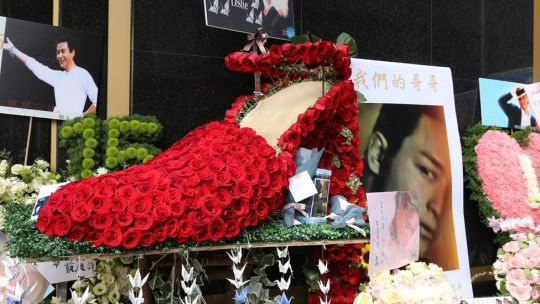
Leslie remains beloved, even if he’s understood, perhaps, about fifteen years too late.
Rest in peace, 哥哥.
305 notes
·
View notes
Photo
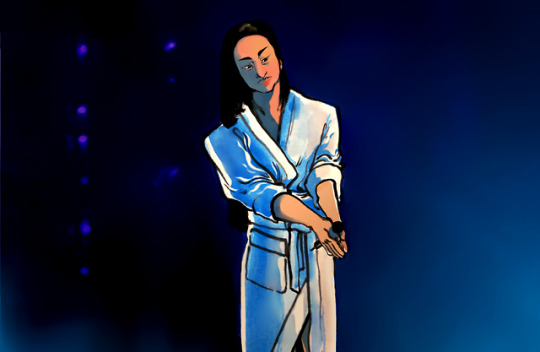
“A Thousand Dreams of Leslie” Essay by Chelsea Shieh now up on Medium!
The Sinθ Iconic Sino Films Tournament ended with an explosive last round of voting — Farewell My Concubine (Chen Kaige, 1993) was crowned champion over Happy Together (Wong Kar Wai, 1997) by popular vote. It was no coincidence that the beloved Hong Kong superstar Leslie Cheung was the main lead in both films.
In loving memory of Leslie, our staff contributor Chelsea Shieh wrote “A Thousand Dreams of Leslie,” a heart tugging, ethereal essay on the sparkling life and dreams of the music icon — from his rough, humble beginnings, to the rise of his spectacular career and his splendid legacy as our eternal star. The essay was originally published in Issue #4 “ACROSS 岸” and is now fully available on Medium.
Read the essay now on Medium
Illustration by Albedo Au
Facebook | Instagram | Web | Pinterest | Medium | RedBubble | Blurb
Follow sinθ magazine for more daily posts about Sino arts and culture.
32 notes
·
View notes
Text
watchlist for the rest of the year:
anita mui's works to commemorate her 20th deathversary 🫡
executioners (1993) (will be up tmrw on my yt if it doesnt get taken down! sequel to the heroic trio (1993))
rouge (1988) (also starring her bestie, leslie cheung <3)
wu yen (2001)
anita (2022) (biopic released last year, it has mixed reviews but i wanna check it for myself)
finishing andy's filmography (not including cameos):
brothers (2007)
look for a star (2009)
future x-cops (2010)
founding of a party (2011) (technically a rewatch LOL)
cold war (2012) (might fuck around and add 2 as well since 3 is coming out... soon? ish)
switch (2013) (notoriously bad so im looking forward to it <3)
firestorm (2013)
my beloved bodyguard (2016)
the adventurers (2017)
fagara (2019) (yes im aware this is technically a cameo role but im in love w sammi cheng so it works out <3)
documentaries starring andy:
keep rolling (2020), about ann hui's body of work; might push this back since i do want to watch more of her films first tbh
boundless (2013), about johnnie to's body of work; same as above, I've seen more of johnnie to's stuff but he's also way more prolific and most of his more high profile stuff i havent touched yet
4 notes
·
View notes
Text
Eye will be watching Days of Being Wild at 7.00pm GMT +3.00 which is, in keeping with my current trends, a Wong Kar-Wai film featuring Leslie Cheung my beloved 💟 if anyone wants to join me hit the dms
0 notes
Text
Heavenly Queen's Male Friends & Colleagues (2012)
Faye Wong, whose ancestral hometown is in Harbin, was born in Beijing on August 8, 1969. In 1987, she gave up her admission to the Department of Biology at Xiamen University and moved to Hong Kong where she studied music with Dai Si-Chung. In 1989, she signed with Cinepoly Records and released her first solo album. Since then, she officially entered the music industry. As one of the best female singers in Chinese music, she has a high reputation in the Chinese world, and also a certain level of popularity overseas, especially in Japan. She has sung many popular songs and her music has a very personal style and an ethereal voice. She is known for her straightforward personality, wise eyes, languid expression, and can be sometimes random, sometimes frivolous, sometimes calm, sometimes inspiring.
It is said that behind every successful man, there is always a woman who silently contributes. And behind this goddess, there are also men who we are familiar and unfamiliar with. Of course, the Heavenly Queen's men are not only a part of her "love history", some can be said to have made Faye Wong today.
Faye Wong & Leslie Cheung
Film and television
These are two outstandingly unique people in the hypocritical entertainment industry. They were born for love, with the same adult childlike innocence, the same straightforwardness, the same sensitivity and passion, the same love and hatred, the same low-keyness and elegance, the same status above common mortals! To everyone, their biggest collaboration was the movie "Okinawa Rendezvous".
According to reports, the actor in "Okinawa Rendezvous" was supposed to be Xiang Tai's son. But Faye Wong said she only wanted to collaborate with Gor Gor (Legend Leslie). The friendship between the two also began with "Okinawa Rendezvous". At the time, the two were filming on location in Okinawa. Leslie Cheung greatly appreciated Faye Wong's personal character and praised her: "This woman is special!"
Faye Wong has starred in few movies. In "Chungking Express", her character liked Tony Leung a lot but didn't kiss him. But in "Okinawa Rendezvous" she finally gave her first on screen kiss opposite Leslie Cheung. Leslie joked at the time that the biggest attraction to make this movie was to kiss Faye. However, this scene was later deleted, so we missed it in the film.
At the Hong Kong Film Awards, Faye Wong and Leslie Cheung were guests. Leslie Cheung "touted" Faye Wong's acting skills. Faye was embarrassed and quickly changed the topic. Gor Gor reacted well and made fun of her. Faye showed affection in her eyes. It can be seen that the two have a good relationship.
Music
In music, the two also had a collaboration with the song "Forgetting You Is Like Forgetting Me". Leslie Cheung sang "Beloved" in Shanghai one year, the last line was la la la la, he asked the audience: "Do you think I am learning from Faye Wong?"
To shoot the music video for the "Okinawa Rendezvous" theme song "Without Love"; Faye Wong, who is in a different record company from Gor Gor, also knew how to cast the female lead for this song.
Life Stories
Leslie Cheung went to Faye Wong's house and liked to play with [Leah] Jing Tong. Later, after Gor Gor's tragedy, Jing Tong asked Faye, why did Uncle Cheung not come over for a long time?
Once the two snuck away to go shopping and agreed to buy something to eat together. But when the time came, Gor Gor went to the restaurant and found that Ah Fei had not yet arrived, so he took Tong Tong to wait for Ah Fei at the door. It was more than an hour wait. When Ah Fei finally showed up, not only did Gor Gor not complain, but he also asked her excitedly what she bought. Faye Wong, who is introverted, quickly melted in the face of her enthusiastic brother. Ah Fei's simplicity and true temperament amazed Gor Gor, so he always loved Ah Fei as his sister.
Mahjong Story
The joke about Faye Wong playing mahjong has been widely spread, but many people do not know that this joke was originally revealed by Leslie Cheung. In an interview, he talked about Faye Wong playing mahjong and imitated her expression and Beijing accent.
Faye Wong's big diamond ring flickered in the eyes of friends during the game. Because of this, Gor Gor said that when he plays mahjong in the future, he must wear one to match!
Program Transcript:
Leslie Cheung: I just told [Matilda] Tao Zi the story of Faye Wong playing mahjong. Would you like to hear it? Once she played mahjong at my house and wore a diamond ring with many carats. Then I said, "Okay, I will win your ring today!" She said, "It's not that easy, it's expensive!"
Once Carina Lau was sitting behind her, watching her play mahjong and she said, "Hey Faye, how can you play this card?." She (Faye Wong) turned back and said very seriously: "I tell you, if you say I can't sing well, I can accept it. But if you say that I am bad at mahjong then I totally cannot accept it!”
Although he has passed, may Gor Gor be happy in heaven and may Faye Wong be happy in the mortal world!
Faye Wong & Leon Lai
"The Legendary Ranger" was a TV drama that Faye acted in. Whether on set or in real life, Faye was very close to Leon Lai, the leading actor. Leon Lai was another gossip king. In fact, all these rumors started because they are both Dai Si-Chung's students and also both are from Beijing. It was very natural for the two to become good friends immediately after they met in the Dai family. What's more, Faye Wong was new in Hong Kong at that time and her connections were very sparse. There were only a few close friends. It was normal to meet someone who spoke Mandarin and had some personal contact. Moreover, both of them have a passion for Beijing. Faye Wong wanted to go back to Beijing to date her boyfriend Luan Shu. Leon Lai wanted to go to Beijing for some social activities. The two would go together and it was reasonable.
The Hong Kong media discovered by accident that the two appeared together at the Hong Kong airport, and they were on the same flight, and the destination was both Beijing. They asserted that Leon was a lecherous male friend, the gossip was constant, but their love affair was simply impossible.
Seeing these reports, Faye Wong just smiled lightly. She was an extremely assertive girl, and she knew in her heart what kind of man she wanted and what her emotional needs were. First, she doesn't like men who talk too much. Second, she doesn't like high-profile men. Third, she doesn't like uncommunicative men. Judging from these three points alone, Leon Lai is not among her choices. What's more, the man she likes is the kind that is extremely mature, highly opinionated, and very individualistic. He doesn't have to be tall and handsome, but he must be independent.
Later, Faye Wong also addressed her own scandal. She seemed to have completely changed her previous style and started talking to the media. Rumor had it, that Leon invested 30 million to shoot "Leaving Me Loving You" in order to chase her. The outcome was futile and she couldn't help but laugh.
Leon himself is the gossip king and almost all the actresses he has worked with have exploded in popularity. As early as when the two first collaborated on "The Legendary Ranger", the gossip had already been reported. Later, Faye Wong and Nicholas Tse fell in love, and the media said that Faye’s love object was Leon Lai and Nicholas Tse was suspected of winning her love. Later, when Faye and Nicholas Tse were at odds with each other, there was news that Leon intervened. Faye and Nicholas Tse have gone through four years of turbulence, and the road has finally come to an end. In "Leaving Me Loving You", there were some interesting performances between Faye and Leon, especially the image of Leon burying his head in Faye's arms. It was naturally intimate which cannot help but be analyzed by the media.
In 2004, Leon Lai served as the producer and creative director of the film "Leaving Me Loving You". It was reported that Faye Wong's offer for the film was originally HK$8 million, but because of her close relationship with Leon, she agreed to appear in the film for HK$5 million.
Faye Wong and Leon went to Taiwan to promote the new romantic film "Leaving Me Loving You", and their gossip became the focus of public concern. Regarding the rumor that Leon was looking for Faye to co-star in order to rekindle an "old love", Faye immediately denied that "there is no old love at all!" and Leon said: "If I wanted to date her, why bother shooting a film and make it so difficult?"
Faye Wong said that she and Leon Lai knew each other when they studied with Dai Si-chung more than ten years ago. Because they are both from Beijing, they felt very friendly every time they met, so this time Leon was promoted to be the boss to shoot "Leaving Me Loving You" and invited her to collaborate. After reading the script, she readily agreed.
In 1992, there was a magazine article when Leon was already a heavenly king, and Faye Wong, who was called Wong Jing Man, was just becoming famous. The reporter asked Leon: “You seem to have a good relationship with this girl?” Leon said, “Yeah, because we are both from Beijing, we have known each other for several years. Don’t look at her as cool. She is actually a very sincere, honest, and easy-going person.”
Faye Wong & Beyond
The science fiction TV series "The Legendary Ranger" is not Faye Wong's acting debut. Before Faye Wong went to the United States in 1991, she made her first film. This movie is called "Beyond's Diary", a typical early Hong Kong film, very cheesy but catering to the mindset of Hong Kong people at that time. The film's leading actors are Wong Ka Kui, Wong Ka Keung, Yip Sai Wing and Paul Wong. Faye Wong plays Yip Sai Wing's girlfriend in the film. In the film, the four friends of Beyond are good brothers who have a sense of justice and struggle for a common music dream. But in life, they are constantly frustrated, trapped, and persevering. As Yip Sai Wing's girlfriend, Faye Wong has a very small role in the film, just a very ordinary supporting role. But at the time, Wong Ka Kui, who was already a big brother, favored Faye Wong and said publicly on many occasions: "Wong Jing Man will definitely become popular in the future."
Yip Sai Wings’s manager said that the film was made a long time ago. She only remembered that Faye Wong wasn’t as fashionable as now, but Wong Ka Kui predicted that she would be popular. Beyond was very supportive of her and has written several songs for her.
Faye Wong and Beyond's collaborations:
Movie: "Beyond's Diary"
Songs:
"Singing A Never Ending Song" (sung by Wong Jing Man and Beyond), included in an early Beyond album.
"The Unsettled Heart" (sung by Wong Jing Man and Paul Wong), included in the album "Wong Jing Man" in 1989
"Can You Hold Me Tight" (composed by Wong Ka Kui), included in the album “Everything” in 1991.
"Reignite" (composed by Wong Ka Kui), included in the album "Coming Home" in 1992.
"Guardian Angel" (composed by Wong Ka Keung), included in "Help Yourself" EP in 1997.
Faye Wong & Tony Leung
Tony Leung and Faye Wong have collaborated three times on the big screen: Chungking Express, Chinese Odyssey 2002, and 2046. In Chungking Express, Tony was the policeman who talked to soap and charmed everyone. Faye Wong also acted well in it, languidly, which is her consistent mood. This film was the first time that Tony Leung played a leading role in a Wong Kar Wai film. "Chinese Odyssey 2002" is a Jeffrey Lau-style mo lei tau comedy film. Faye Wong and Tony Leung sang Huangmei opera which is very impressive. 2046: Did you understand this film? After seeing it, I felt dazed and confused. I only remember Faye Wong talking on the phone in Japanese. Tony Leung and Faye Wong acted as purely good friends.
It is said that Tony Leung is a fan of Faye Wong. There are several women in the entertainment circle who love mahjong. When Carina Lau, Faye Wong, and Matilda Tao were at the same table, Carina Lau called Tony, who was filming, and gave the phone to Faye to talk to him. Because Carina Lau knew that Tony liked Faye, he stammered on the phone which was awkward. Tony must really like to listen to Faye to have this reaction.
Tony Leung once commented that Faye Wong was "a very humble person who often confessed to being "unable to act" on set, but in fact she was very straightforward and was an excellent actress who was good at using body language to perform."
As we all know, Faye Wong and Tony's wife Carina Lau are best friends. Faye and her family attended Tony and Carina's wedding and Faye also sang. A reporter interviewed Carina Lau and felt that she and Tony had different personalities. They asked if there was friction between them. Carina Lau replied frankly: "There will be friction. Not only between two personalities, but there will be friction between people. Sometimes my teeth will bite my tongue. I have also thought about this problem. My good friend Faye Wong and Tony are quite similar to each other, but if they lived together, they may not produce a good result. I am very similar to Ya Peng, so these traits actually need to complement each other." This shows that Faye Wong and Tony Leung are more similar people than personal friends.
Faye Wong & Jacky Cheung
Faye Wong and Jacky Cheung have always been the only Chinese gods in many people's minds. It is rare to see two powerful people on the same stage. In 1997 on TVB, Faye Wong and Jacky Cheung paired up and the reverberations can still be felt to this day. Jacky Cheung once said: “Ah Fei is the pride of Chinese music, I always admire her!”
Faye Wong & Andy Lau
Andy Lau said: “If Faye Wong sings, I am willing to be part of the audience!” And on many occasions, Wah Jai expressed his hope to collaborate with Faye in movies. Many years ago, Faye Wong and Andy Lau did a photoshoot. In the photo, Faye "teased" Wah Jai.
Faye Wong & Aaron Kwok
Most people think that Faye Wong and Aaron Kwok had no interactions and their only collaboration was probably a series of Pepsi advertisements. In fact, there was a performance of the Heavenly King and Queen in 1993 on the TVB Singers Anniversary. He and Faye coolly performed Aaron's famous song "Never Ending Love for You".
Faye Wong & Zhang Yadong
One is the queen of music and the other is a golden producer. For some time, the names of Faye Wong and Zhang Yadong were often closely linked. Some people say that because Faye gave him a relaxed creative environment and no pressure, he was able to develop his musical talent, fame, and became popular all the way, so Faye Wong made Zhang Yadong. Some people also said that it was Zhang Yadong who was different from the mainstream. He had a vibrant and gloomy electronic sound at that time and developed a temperament that was different from other Hong Kong and Taiwan mainstream songs, which made Faye Wong reborn and gave her her own new style. Continuously creating new peaks, Zhang Yadong paved the way for Faye Wong, and finally let Faye Wong sit on the throne of the Asian music world. Regardless of which argument is supported, it has been an indisputable fact that the two have collaborated in the music world for more than 10 years and brought us many popular songs.
According to rumors, Faye Wong and Zhang Yadong had a brief love affair, but it is not known whether it is indeed fact or wishful thinking by outsiders. However, Zhang Yadong never hesitated to appreciate Faye Wong: “Faye Wong is a near-perfect person in my eyes, and I admire her!”
Faye Wong & Lin Xi
Without Lin Xi’s lyrics, Faye Wong’s sound of nature voice could not resonate. Lin Xi said, "Faye Wong is my unnamed wife", which shows how sharp he is to Faye’s insight. It was rumored in a gossip tabloid that Lin Xi saw Faye Wong catch Dou Wei in bed cheating, and wrote the song "New Tenant" with a pen. Admittedly, even if Lin Xi did not meet Faye Wong, she would not be without a name. But when meeting Faye Wong, Lin Xi can be said to have obtained a rare source of inspiration for life.
Faye Wong & Dai Si-chung
Dai Si-chung is a famous music teacher in Hong Kong, known as "the godfather of music" and "father of superstars". Since the 1970s, Dai Si-chung has cultivated Cheung Ming-man, Faye Wong, Andy Lau, Leon Lai, Aaron Kwok, Nicholas Tse, Daniel Chan, etc. At the same time, Tony Leung, Michelle Reis Ray Lui, Frankie Lam, Nina Li Chi, Gigi Lai, Anne Heung and other actors also studied under Dai Si-chung .
It is said that Faye Wong was first introduced to Dai Si-chung by her father's friend. At that time, Dai Si-chung was giving vocal lessons to several students. He carefully looked at Faye Wong and found that she had a distinctive temperament. At that time, he thought that with her temperament, her standing on the stage would definitely interest the fans, but he wondered if her talent was really that good. He asked her, “whose song do you like best?” in Cantonese and found Faye Wong standing there with question marks on her face. Then he asked again in very pure Mandarin. It was the first time in Hong Kong that Faye Wong had heard someone use Mandarin so accurately and freely. It was a bit surprising and unusual, and she said without hesitation: “Teresa Teng”.
Soon after, Dai Si-chung recommended Faye Wong to his friend Chan Siu Bo, general manager of Cinepoly Records. Dai Si-chung said, “I just accepted a student and her talent is very good. It may be unmatched in the entire performing arts circle in Hong Kong.” After only meeting once, Chan Siu Bo decided to sign a contract with Faye Wong.
Another rumor was revealed after Dai Si-chung passed away from illness... If it were not for Dai Si-chung who desperately called Faye Wong back to Hong Kong on New Year's Day in 1992, the "Heavenly Queen Faye" who later ruled the Chinese music industry would not exist.
At the end of 1991, Faye Wong had a conflict with "Ah Lai”, a general manager at Cinepoly and decided to study in the United States. But she missed the start date when she arrived in the United States and could not enter the school.
On New Year's Day in 1992, Faye Wong called Dai Si-chung and asked what she should do next. Dai Si-chung told Faye Wong very firmly: "You must come back immediately! If you stop [promoting] in Hong Kong for half a year, people will forget who you are, and all previous efforts will be lost." Dai Si-chung also analyzed the situation at the time for her, because Anita Mui announced that she would no longer accept awards, and there was a lack of dominating female singers, this was the perfect time for Faye Wong to grab the top spot...
Faye Wong flew back from New York to Hong Kong on the third day of the Chinese New Year. Next, Faye Wong's "Fragile Woman" was a smash hit and since then, she has skyrocketed to become an unparalleled queen.
In 2010, Dai Si-chung died of illness. Faye Wong went to Hong Kong for the funeral and brought Buddhist scriptures to Dai Si-chung's family. In addition to writing a eulogy, Faye Wong used an MP3 to record a personal vocal "Heart Sutra" and sent it to her teacher. An insider said: "Faye Wong instructed Wancy Tai to put the MP3 in teacher's bed and play it day and night, and at home. Open a chant for teacher and hope that he can rest in peace!"
Faye Wong & Wong Kar Wai
In Faye Wong's few big screen experiences, the collaboration with Wong Kar Wai is definitely a highlight. In addition to "Chungking Express" and "2046", a mobile phone advertisement filmed by Faye in 1997 was also directed by Wong Kar Wai. Although "Chinese Odyssey 2002" was directed by Jeffrey Lau, it was produced by Wong Kar Wai. Wong Kar Wai once evaluated Faye Wong as the sexiest actress he has ever worked with and said she is a natural actor.
Faye Wong & Chang Chen
When Chang Chen filmed Wong Kar Wai's new film "2046" in Hong Kong, he admired Faye Wong very much to the media. As a result, news of his admiration for Faye Wong came out. At the time, Chang Chen revealed that he hoped to start shooting "2046" as soon as possible because he wanted to collaborate with Faye Wong. He frankly admitted that he had a great affection for Faye Wong and said that "secret love for a person can actually be a happy thing and no one can stop it..." Afterwards, a reporter asked Faye about his secret crush on her. Heavenly Queen who is always straightforward, asked the reporter: "What should be my reaction?"
Faye Wong & Phil Chang
Na Ying, Phil Chang, and Faye Wong belonged to EMI at that time. Phil Chang said that he, Faye Wong, Na Ying together supported Taiwan, Hong Kong and the mainland markets. Faye sang the Cantonese version of Phil Chang's song "Well-Intentioned" called “Heaven and Earth". The two are also friends. Years later, Phil Chang once revealed on a show the interesting fact that Faye Wong and Na Ying played mahjong.
Faye Wong & Jeff Chang
Faye Wong once invited three friends to hold a concert: Na Ying, Jeff Chang and Carina Lau. At the time, there were some songs that Faye Wong sang to Tong Tong, such as Health Song, Too Soft-hearted, Love's First Taste, One Night in Beijing, Give Up Halfway, and so on.
Faye Wong was very good in this performance when she he sang Mavis Fans’s [Health Song] with Na Ying and Jeff Chang. Jeff Chang pretended to be a grandpa and sang "three turns left, three turns right, twisted neck, twisted butt, early sleep and early rise, let's play mahjong!" And Faye Wong sang "Grandpa, jiāyóu!"
------------------------------------------------------------------
SOURCE: WENXUECITY // TRANSLATED BY: FAYE WONG FUZAO
1 note
·
View note
Text
since today (sept 12) is Leslie Cheung's birthday i truly recommend anyone reading this to watch this video of him performing his song "red" (the video linked has eng subs so u can enjoy the lyrics too)
#leslie cheung#if you have never seen it pls check it out#its truly iconic !!! the dance the outfit everything !!!!!#☆゚* 🍰・゚ music ; leslie my beloved
13 notes
·
View notes